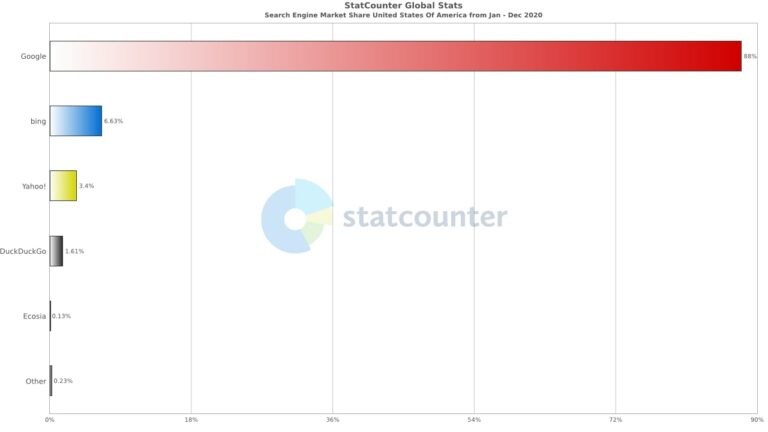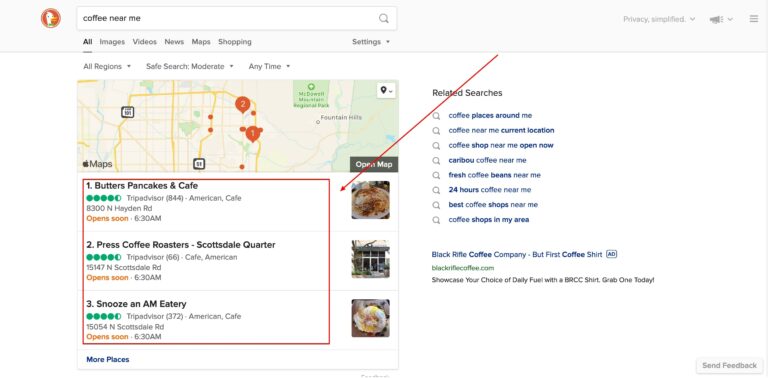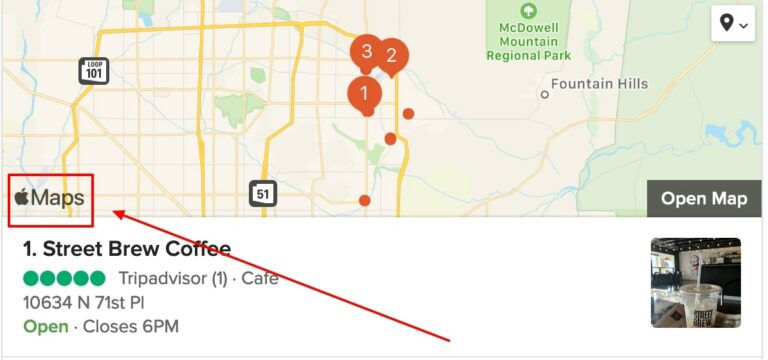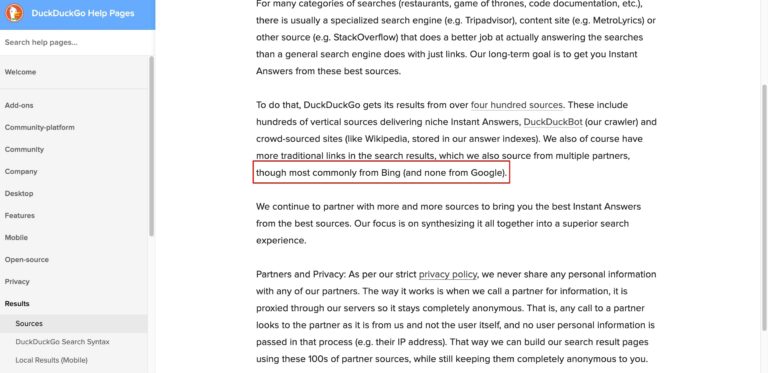31 Jan DuckDuckGo SEO: What You Should Know via @mindyweinstein
DuckDuckGo hit a milestone in January 2021 when it reached 100 million searches per day for the first time.
That begs the question: Are you optimizing for DuckDuckGo?
DuckDuckGo has been quietly attracting users and generating more traffic to websites.
Over the last couple of years, I have done my own research and discovery to uncover what it takes to perform well in DuckDuckGo results.
Now, before you continue reading, understand that there is no magic bullet or easy answer.
Instead, most of what you need to focus on in terms of DuckDuckGo search engine optimization (SEO) is not shocking, newsworthy, or tricky.
We’ll get to that in a bit.
First, here’s a little background on DuckDuckGo.
Why We Should Care About DuckDuckGo
My research into DuckDuckGo started in 2018 and at that time, data privacy concerns were already on the rise.
With antitrust claims against some of the giants including Facebook, Amazon, Apple, and Google, people are paying attention to their privacy policies.
As that awareness has grown, more and more searchers are showing apprehension regarding how their information is collected and shared.
This is one area where DuckDuckGo really shines.
In fact, the way DuckDuckGo handles data is what set this search engine apart from the beginning.
According to DuckDuckGo, it never stores your personal information or search history.
It doesn’t follow you with ads or track you across the Internet.
DuckDuckGo’s mantra is simple: “no tracking, no ad targeting, just searching.” It calls out Google on its site by pointing how much Google is tracking you and using your data for ads.
According to DuckDuckGo, there were nearly 24 billion searches conducted on its site in 2020, which reflected an approximate 57% increase from 2019.
The daily average number of searches in December 2020 was around 79 million. Compare that to December 2019, when there were about 48 million searches.
Below is a chart published on DuckDuckGo.com that illustrates the growth:


While these are all impressive numbers, it’s important to put them into perspective.
DuckDuckGo’s market share pales in comparison to the other major players: Google, Yahoo, and Bing.
Per Statcounter.com, DuckDuckGo’s U.S. search market share in 2020 was 1.61%.


However, you need to watch your own analytics trends.
When reviewing various websites, I discovered that some, if not all, are getting traffic at a high growth rate from DuckDuckGo.
Although these numbers are still small, it’s something to watch.
Below are analytics comparing 2019 and 2020 organic traffic from DuckDuckGo.
The total percentage of organic traffic from DuckDuckGo only comprised about 2% in 2020 for this particular website, but the number of sessions was nearly 2.5 times what it was in 2019.


What We Should Know About DuckDuckGo
DuckDuckGo states that it gets its results from more than 400 sources, ranging from crowdsourced websites to its own crawler, DuckDuckBot.
Because DuckDuckGo focuses on privacy, it does not know exactly where the searcher is located.
However, it can approximate the location information through a GEO::IP lookup.
DuckDuckGo explains how this works on its blog:
“When you hit the search button, your computer sends your search request to us. In that request, your computer embeds additional information. For example, if you opt-in to location sharing for a site, this information includes your approximate location. And even if you don’t, your request includes your IP address, and an approximate location can be inferred from it, though it isn’t always accurate.”
I tested this with the query [coffee near me] without enabling my location and it was still pretty close:


In case you didn’t notice in the screenshot above, DuckDuckGo is using Apple Maps to populate local search results:


Now that you understand DuckDuckGo better, how can you use this information?
How to Approach SEO for DuckDuckGo
There is little information about optimizing for DuckDuckGo outside of the traditional SEO methods.
1. Attract Quality Links
Don’t roll your eyes at this tip. It’s directly from DuckDuckGo.
I took a screenshot when I came across this information a couple of years ago and I believe it still applies.


Search Engine Journal has a great resource for link building that you can reference for this particular DuckDuckGo tip: Link Building for SEO: A Complete Guide.
SEMrush, SpyFu, Ahrefs, and Majestic are all tools that can help you identify and vet link opportunities.
You must focus on quality links, but shouldn’t that always be the case?
2. Know What the Searcher Might Query
Given the privacy approach of DuckDuckGo, searchers will likely adjust how they conduct queries.
For example, if I know that DuckDuckGo cannot pinpoint my exact location but I want a local result, I might add a geo-qualifier to my query.
You will need to get into some pretty deep keyword research to truly understand your visitors coming from DuckDuckGo.
Tools such as Seed Keywords, SpyFu, SEMRush, and SE Ranking can all help you understand how people are searching for your products or services.
For more tips, check out: A Deep Keyword Research Process That Will Attract More Customers.
3. Optimize for Bing
Wait, aren’t we talking about DuckDuckGo?
Here is a snippet from DuckDuckGo’s Help Pages that addresses Bing:


We know that DuckDuckGo is pulling from Bing, so let’s ensure we are following best practices for this search engine, too.
This is something that you should be doing anyway, considering it has a decent share of the search market.
For example, review your XML sitemaps. Make sure they are accurate and error-free and submit them to Bing Webmaster Tools (credit to Micah Albert on this tip).
In addition, use Bing Webmaster Tools to check the health of your website, monitor crawl and indexation performance, and identify optimization improvements.
Bing’s SEO Reports can also come in handy at this point.
For additional information on Bing SEO, read 5 Ways SEO for Bing is Different from Google SEO.
4. Claim & Update Apple Maps Listing
If you haven’t claimed your Apple Maps listing, aimply go to https://mapsconnect.apple.com.
There are basic fields to complete once you have claimed your business, including:
- Business name.
- Address.
- Phone number.
- Hours of operation.
- Categories.
- Website.
- Social media profiles.
Keep DuckDuckGo on Your Radar
Again, there is no magic bullet or secret sauce when it comes to optimizing for DuckDuckGo.
Instead, you have to focus on attracting quality links, user-focused keyword research, and optimizing for the search engines that DuckDuckGo is using.
Basically, it’s a matter of getting all of your SEO ducks in a row (sorry… I have been waiting for a chance to use this bad pun).
More Resources:
- DuckDuckGo Adds Quick Answers to Search Results
- 17 Great Search Engines You Can Use Instead of Google
- The Biggest SEO Trends of 2021, According to 42 Experts
Image Credits
All screenshots taken by author, May 2018 & January 2021
Sorry, the comment form is closed at this time.